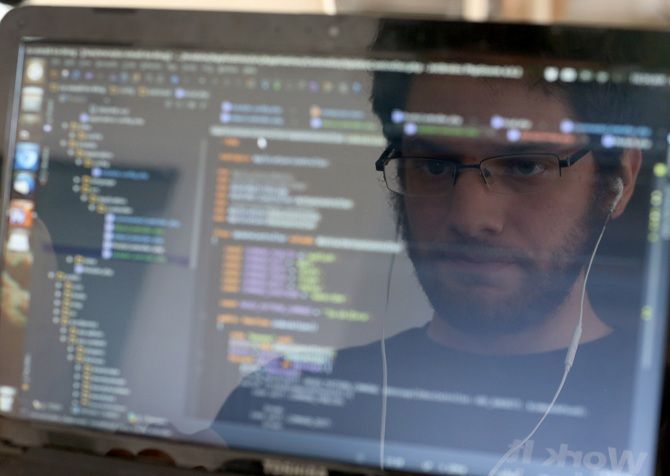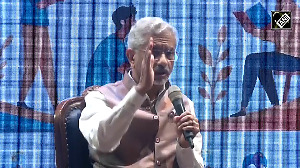The Smart India Hackathon 2017 saw them build computer programmes or smartphone applications for 598 problems identified by different government departments. Alnoor Peermohamed & Karan Choudhury report.

Photograph used for representational purpose.
Photograph: Joe Raedle/Getty Images.
The government is drawing lessons from Silicon Valley majors, such as Google and Facebook, to find solutions to problems such as water woes in Rajasthan, drainage in Mumbai during heavy rain, and the safety of women. Silicon Valley companies often provide open-ended ideas to engineers outside their ecosystem to find solutions to some of their biggest problems.
At the Smart India Hackathon 2017, about 10,000 of the brightest techies and tech students are putting their heads together at multiple centres across the country to fix what they see as broken.
"If you look at the various government departments, you will see they are large organisations with 60-70 years of legacy. So, it takes time for them to change and innovate," said Sachin Gupta, co-founder and chief executive officer (CEO) of HackerEarth, a network of programmers and software developers. "This hackathon will accelerate the task of identifying problems and the solutions."
Hackathons have become a mainstay in India's start-up ecosystem. Companies look for ideas as well as try to hire talent at such events. Government agencies, such as the Unique Identification Authority of India (UIDAI), also use these as fertile hunting grounds for ideas.
Some of the participants are as young as 10. Others come from colleges, including the Indian Institutes of Technology. At the Smart India Hackathon, they will try to build computer programmes or smartphone applications for 598 problem statements prepared by different government departments.
The solutions will be evaluated by judges from ministries concerned and industry experts. There are rewards also -- the top three teams will get Rs 1 lakh, Rs 75,000 and Rs 50,000, respectively.
For students, this is an opportunity to explore ideas as well build networks that might help them in the future.
Gurshish Singh Thupar, a third-year telecommunications student at the MIT College of Engineering, Pune, along with his six-member team, is building a solution to allow satellites or drones to track cars. "The Hackathon is a good platform for us to be noticed by people whom we would have never got access to otherwise. This also helps us get involved with the government and find solutions to the nation's problems," he said.
Prime Minister Narendra Modi, who addressed the participants through video-conferencing, projected this event as a nation-building exercise.
Of the 7,500 teams that had applied to take part, 1,266 were selected. The event is already a big success, but solutions that the teams put together in 24 to 36 hours -- some of them surprisingly comprehensive -- need to be implemented effectively, say experts.
The government is yet to define steps to ensure this.
"Good ideas should not get bogged down by slow bureaucracy," said Srikanth Nadhamuni, co-founder and CEO of Khosla Labs and former head of technology at UIDAI. "There are a lot of creative youngsters who build amazing things if you give them room and support. The only concern is that there needs to be some sort of a follow up. You can't build a full service in 24 hours. I think the government needs to define steps to implement some of these solutions."












 © 2025
© 2025